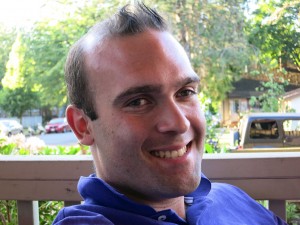Jesse Ferreras graduated from UBC Journalism in 2008. Starting as a news reporter at Pique Newsmagazine, he is currently a national online journalist at Global News.
1. What did you do right after you graduated from the Journalism School?

My first job out of journalism school was as a news reporter at Pique Newsmagazine, a wonderful publication that covers the Sea to Sky region, including Whistler, Squamish and Pemberton.
2. What other positions have you held since graduating from j-school?
I have been an online editor at Canada.com, an associate editor at The Huffington Post British Columbia, and an associate editor, trends and traffic at The Huffington Post Canada.
3. Where do you currently work? Can you tell us a bit about your current role?
I currently work at The Huffington Post Canada. As associate editor, trends and traffic, it’s my job to look for content, write, edit and format it in a way that will connect with our audience, then promote it on social media. I monitor metrics very carefully to see how stories are performing on various platforms, including desktop, mobile and networks such as Facebook.
4. What is your experience like at The Huffington Post so far?
It¹s been a wonderful post-post-secondary education. The Huffington Post has taught me so much about how to make stories succeed online. My news judgment has evolved and taught me about whole new topics that interest readers, and helped me develop strong insights into how people consume information on the Internet.
5. How did your j-school experience help you to transition into your career?
I graduated at a time when the UBC School of Journalism was just beginning its transition into multi-platform instruction. It was very rewarding because it gave me a good base of knowledge in areas such as video, radio and online, enough that I was able to transition into web responsibilities easily in my first job.
6. What has been the piece of journalism you’ve produced of which you¹re most proud?
I have two. One of them talks about B.C. electricity rates, and how purchasing green energy jacks up ratepayers hydro bills.
The other is this one, about the efforts that Generation Y members of First Nations are undertaking to save their languages.
7. What is your fondest memory at the j-school?
Writing a story for the Ubyssey about RCMP officers who were photographed putting drunk women in handcuffs (PDF) in a ‘playful’ manner:
The story was a potentially sensational one, but instructors at the School of Journalism helped me word it in a careful and respectful manner, and ensure I was being fair to all sides. It was a very instructive experience.
8. Would you recommend the j-school and why?
Yes, particularly to people who are interested in the craft but don’t have much experience yet. Instructors at the School of Journalism will teach you how to write, make your prose more clear and concise, and give you a technical foundation that will help you transition into various jobs.
9. Of the lessons you learned at UBC, which one has proven to be the most valuable?
When Stephen Ward was the director of the School of Journalism, he taught an ethics class in which he talked about the value of ‘pragmatic objectivity.’ It’s a theory that recognizes that journalists should not be mindless drones who report ‘just the facts.’ Instead, it encourages them to bring critical inquiry to the table, while foregrounding a reverence for factual accuracy and fairness.
10. Would you like to add anything else?
Only the same advice that I offer to all journalists starting out: be open to new places and experiences. Don’t limit yourself to one medium, one form of journalism, or one location in which you’d like to work. When you’re starting your career, take stock of what’s out there, and tailor your skills to what the market demands. Don’t take the attitude that you won’t be happy if you don’t get what you planned for. There is joy in discovery.


